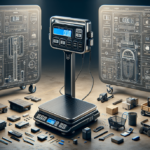Brecknell DCSB vs Salter Brecknell PS1000: An In-Depth Comparison
Choosing the right weighing scale is essential for both businesses and individuals. This comprehensive comparison between the Brecknell DCSB and Salter Brecknell PS1000 scales aims to help you make an informed decision. We will explore their features, performance, cost, applications, customer feedback, and maintenance tips.
Introduction
The Brecknell DCSB and Salter Brecknell PS1000 are renowned for their reliability and precision in various settings. While the DCSB is favored in commercial environments, the PS1000 excels in industrial applications. Understanding their unique attributes will guide you in selecting the scale that best fits your requirements.
Key Features
Brecknell DCSB Features
- Legal for trade certification
- Low profile design
- Stainless steel platform
- Easy-to-read LCD display
- Multiple weighing units for versatility
- Auto power-off feature
- Built-in rechargeable battery
- Tare function for container weight exclusion
Salter Brecknell PS1000 Features
- Large platform size for oversized items
- IP67-rated washdown protection
- Rechargeable battery for mobile use
- Quick and easy calibration
- RS-232 connectivity for data transfer and printing
- Backlit display for low light conditions
- Dynamic weighing capability
- Shock-absorbing mounting plate
Performance Comparison
Accuracy
Both the Brecknell DCSB and Salter Brecknell PS1000 offer high precision in weight measurements. The PS1000 provides accuracy within 0.1%, whereas the DCSB maintains accuracy within 0.2%. Consistent calibration and usage in controlled environments are recommended to uphold these standards.
For more detailed insights on scale accuracy, refer to studies by the National Institutes of Health (NIH) and industry standards by the American National Standards Institute (ANSI).
Capacity and Weight Measurement
The Brecknell DCSB supports up to 5000 pounds, making it suitable for a variety of commercial applications. In contrast, the Salter Brecknell PS1000 can handle up to 10,000 pounds, catering to heavy-duty industrial needs. Both scales measure in pounds and kilograms, with the PS1000 additionally supporting ounces and grams.
Ease of Use and Interface
The DCSB features a user-friendly interface with a clear LCD display and straightforward controls. The PS1000 enhances user experience with a backlit display, dedicated function keys, and the ability to store up to 100 weight readings, which is beneficial for tracking measurements over time.
Durability and Ruggedness
Constructed with stainless steel, both scales are built to last. The DCSB's low-profile design is easy to clean and rust-resistant, while the PS1000's IP67-rated housing offers superior protection against dust and water, making it ideal for harsher environments like factories and construction sites.
Cost Analysis
Budget is a crucial factor when selecting a scale. The Brecknell DCSB is priced around $500, providing a cost-effective solution for commercial use. The Salter Brecknell PS1000, with its advanced features and higher capacity, starts at approximately $800. The additional investment for the PS1000 is often justified by its enhanced capabilities in industrial settings.
Applications Across Industries
Both scales are versatile and serve multiple industries:
- Brecknell DCSB: Retail stores, food and beverage sectors, agricultural applications.
- Salter Brecknell PS1000: Chemical factories, pharmaceutical laboratories, heavy machinery weighing.
Customer Reviews
Users consistently commend both scales for their accuracy and durability. Customers appreciate the DCSB for its straightforward operation, while the PS1000 receives praise for its precise measurements even with moving objects and its robust build quality.
Final Verdict
Choosing between the Brecknell DCSB and Salter Brecknell PS1000 hinges on your specific needs and budget. The DCSB is ideal for commercial purposes where a balance of accuracy and affordability is required. Conversely, the PS1000 is better suited for industrial applications demanding higher precision and greater weight capacities.
Conclusion
Investing in the right scale is fundamental for accurate measurements and efficient operations. Whether in retail, manufacturing, or logistics, a high-quality scale like the Brecknell DCSB or Salter Brecknell PS1000 can significantly enhance productivity and reliability.
Maintenance Tips
- Regularly calibrate your scale to maintain accuracy.
- Keep the scale clean and free from debris.
- Avoid exceeding the scale's maximum capacity.
- Ensure the scale is placed on a flat, level surface.
- Store the scale in a dry environment to prevent corrosion.
- Promptly replace any worn-out parts to ensure optimal performance.
Frequently Asked Questions
Q: What is the weight capacity of the Brecknell DCSB scale?
A: The Brecknell DCSB scale can measure up to 5000 pounds.
Q: Is the Salter Brecknell PS1000 scale easy to clean?
A: Yes, it features an IP67-rated washdown design, allowing for easy cleaning with water jets.
Q: Does the Brecknell DCSB scale have legal-for-trade certification?
A: Yes, it is certified for legal trade use by the National Type Evaluation Program (NTEP).






















